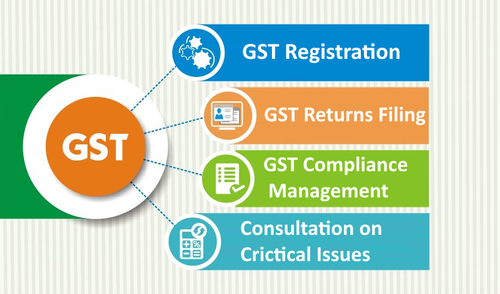Avoid Common Mistakes in Singapore GST Registration for Your Company
Avoid Common Mistakes in Singapore GST Registration for Your Company
Blog Article
Browsing the Complexities of GST Enrollment: Expert Tips and Finest Practices for Easier Conformity
From understanding enrollment demands to taking advantage of technical tools for streamlined processes, the trip in the direction of smoother GST conformity is diverse and nuanced. Remain tuned to uncover important techniques and insights that can aid services steer through the intricacies of GST enrollment with finesse and confidence.
Recognizing GST Enrollment Demands

In addition to turnover thresholds, organizations participating in interstate sales or offering taxable solutions may also be needed to sign up for GST, also if their turn over is listed below the suggested limit (Singapore GST Registration). Recognizing these demands and thresholds is vital to avoid penalties and make sure smooth operations within the legal framework
In addition, businesses must collect and prepare the required documents, such as proof of identity, address, business unification, and financial institution account information, before launching the GST enrollment process. Failing to provide exact details or satisfy the enrollment deadlines can lead to penalties or other legal repercussions. Companies need to remain notified about the particular GST enrollment requirements suitable to their procedures to keep conformity and stay clear of possible problems.
Organizing Crucial Documents
Companies starting the GST registration process must meticulously compile and arrange the necessary documentation required for entry. The essential papers normally required for GST registration include evidence of service enrollment or incorporation, address and identity proofs of the organization proprietors or partners, bank account details, proof of major business, and authorization types. Ensuring that these papers are easily available and organized can improve the enrollment process and stop rejections or hold-ups.
To efficiently arrange necessary documents, services need to create a central system for saving and classifying the required documents (Singapore GST Registration). Utilizing electronic storage services can aid preserve easy access and make sure that records are safely kept. In addition, developing a list of all needed files can work as a handy device to track what has actually been gathered and what is still required for submission

Leveraging Innovation for Efficiency
Enhancing functional effectiveness through technological combination is extremely important for contemporary businesses navigating the complexities of GST enrollment. One of the vital means innovation can assist in GST enrollment is through the use of automated software options.
Furthermore, modern technology can promote seamless interaction with tax obligation authorities. Online sites and interaction devices allow organizations to submit records, solve queries, and get updates in an extra efficient fashion. This not just expedites the registration process yet likewise aids in preserving clear and trusted interaction with the pertinent authorities.
In addition, visit site cloud-based storage services supply a safe system for services to shop and accessibility their economic information, ensuring conformity with GST record-keeping needs. By systematizing data storage space and automating procedures, organizations can boost their total performance and precision in GST registration procedures.
Proactive Compliance Monitoring

To ensure reliable positive conformity tracking, businesses need to establish durable interior controls, conduct periodic audits, and utilize automation tools for real-time monitoring of GST deals. Regular training sessions for staff members on GST compliance needs can additionally assist in developing a culture of conformity within the organization. In addition, involving with tax obligation experts or professionals can give important understandings and guidance on browsing intricate GST policies.
Involving With Expert Specialists
Involving seasoned tax professionals can considerably strengthen a company's understanding and compliance with detailed GST regulations. Professional experts bring a wealth of knowledge and experience to the table, assisting organizations navigate the complexities of GST registration with convenience. By leveraging their competence, firms can ensure precise filings, lessen the threat of mistakes, and stay up-to-date with the most up to date regulative adjustments.
When involving with professional specialists, it is necessary to choose professionals with a strong record in GST compliance (Singapore GST Registration). Try to find professionals that have a deep understanding of the relevant laws and regulations, as well as experience dealing with companies in your industry. Effective communication is type in this collaboration, so ensure to clearly define your expectations and establish regular touchpoints to discuss progression and resolve any kind of problems
In addition, specialist specialists can supply useful understandings and recommendations on enhancing your tax strategy, identifying potential cost-saving opportunities, and streamlining your conformity procedures. On the whole, buying specialist consultancy services can go a long method in making certain smoother GST conformity and avoiding pricey blunders.
Final Thought
In conclusion, browsing the intricacies of GST registration calls for a thorough understanding of the needs, organization of essential documents, leveraging technology for performance, positive compliance tracking, and engagement with specialist specialists. By following these finest practices, organizations can guarantee smoother conformity with GST guidelines and avoid prospective penalties or fines. It is important to remain informed, positive, and diligent in handling GST enrollment to maintain compliance and promote financial stability.
To ensure compliance with tax top article obligation policies, organizations must completely understand the elaborate needs for GST registration. Product and Provider Tax (GST) is a value-added tax imposed on most products and solutions in a country, making it important for businesses to register for GST to prevent lawful repercussions.Moreover, businesses need to collect and prepare the needed documentation, such as evidence of identification, address, company consolidation, and financial institution account details, before starting the GST enrollment process. Companies need to stay informed regarding the details GST enrollment demands appropriate to their operations to maintain conformity and stay clear of prospective concerns.
The crucial documents typically required for GST enrollment consist of evidence of service enrollment or address, identity and consolidation proofs of the company owners or partners, financial institution account information, evidence of primary location of company, and authorization forms.
Report this page